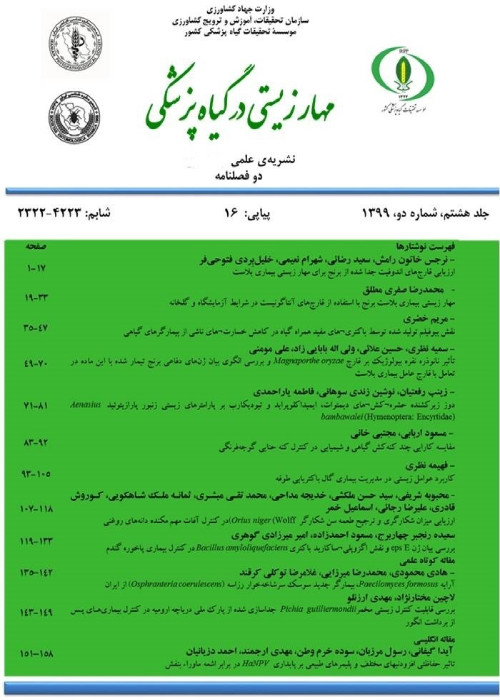Inhibitation of alfalfa endophytic bacteria against Clavibacter michiganensis subsp. insidiosus causal agent of wilt disease in in vitro and greenhouse conditions
Author(s):
Article Type:
Research/Original Article (دارای رتبه معتبر)
Abstract:
Endophytic bacteria are important group of bacteria that produce phytohormones, antifungal and antibacterial agents, siderophore, nutrient competition and induced systemic resistance in the host, causing the biocontrol of plant pathogens. The aim of this study was to obtain endophytic isolates with antagonistic effects against the alfalfa wilt agent, Clavibacter michiganensis subsp. insidiosus in the laboratory and greenhouse. In order to conduct this research study, samples and isolation of bacteria from alfalfa fields in Hamedan province were performed. Then, in the laboratory conditions, their antagonistic effects against Cmi were investigated. The experiments were conducted in laboratory on NA (Nutrient Agar) culture medium in a completely randomized design with three replications by determining the pathogenic bacterium growth inhibition. The obtained data were analyzed by Statistical Analysis System (SAS) software and the means were compared by Duncan's multiple range test. Based on the laboratory studies results, eight antagonistic strains with inhibition diameter higher than 6 mm were selected for the greenhouse studies. In the greenhouse conditions, the strains were evaluated for their effects on increasing growth factors of alfalfa. The results showed that isolates 8 and 56 showed higher biocontrol efficacy. These isolates increased plant growth factors at 1% level statistical probability. The 16srRNA encoding genes of strains were amplified and sequenced. Result showed that they were belonged to the genera Bacillus subtilis, Pseudomonas sp., Escherichia coli, Sphingomonas paucimobilis and Paenibacillus glycanilyticus. These isolates have been effective in biocontrol of wilt bacterial agents in the laboratory and greenhouse conditions, and increasing plant growth factors. Endophytic bacteria including Bacillus subtilis and Sphingomonas paucimobilis showed effective performance against pathogenic bacteria. In addition they had great impact on plant growth characteristics such as fresh weight, dry weight and plant height. These effects may be due to the production of antibiotics and induced systemic resistance to biological control of bacterial wilt disease in the laboratory and greenhouse and increasing plant growth factors. These results are promising and may be used in the biocontrol and the management of soil-borne diseases.
Keywords:
Language:
Persian
Published:
BioControl in Plant Protection, Volume:5 Issue: 1, 2017
Pages:
1 to 13
magiran.com/p1810952
دانلود و مطالعه متن این مقاله با یکی از روشهای زیر امکان پذیر است:
اشتراک شخصی
با عضویت و پرداخت آنلاین حق اشتراک یکساله به مبلغ 1,390,000ريال میتوانید 70 عنوان مطلب دانلود کنید!
اشتراک سازمانی
به کتابخانه دانشگاه یا محل کار خود پیشنهاد کنید تا اشتراک سازمانی این پایگاه را برای دسترسی نامحدود همه کاربران به متن مطالب تهیه نمایند!
توجه!
- حق عضویت دریافتی صرف حمایت از نشریات عضو و نگهداری، تکمیل و توسعه مگیران میشود.
- پرداخت حق اشتراک و دانلود مقالات اجازه بازنشر آن در سایر رسانههای چاپی و دیجیتال را به کاربر نمیدهد.
In order to view content subscription is required
Personal subscription
Subscribe magiran.com for 70 € euros via PayPal and download 70 articles during a year.
Organization subscription
Please contact us to subscribe your university or library for unlimited access!


